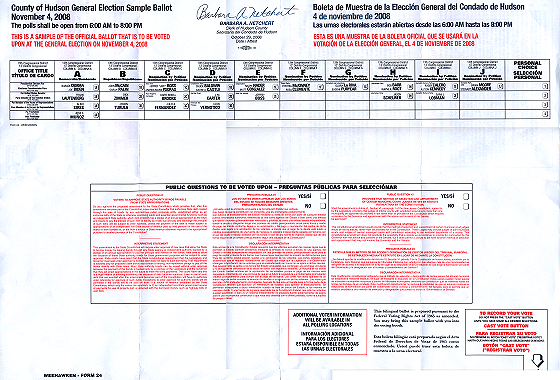7 Nov
New Jersey Ballot Layout Problems
I was not one of the people who ridiculed West Palm Beach voters back in 2000 for being unable to properly read their ballots, but my roommate was. So, he and I were both chagrined to realize after we voted that we’d neglected to completely fill out our ballots. Here’s a pieced-together scan of the sample ballot sent out to all NJ residents before election day:
Note the 11 columns of parties at the top, but only 4 offices being voted for (president, senator, representative and “freeholder,” i.e., like a city councilman but in a township, which is what Weehawken actually is). Then down below, there’s all those blocks of red.
It was only when I was showing the sample ballot to my roommate just before we went to vote at 2pm on Election Day (he’d sent in his voter registration a few days below the deadline and hadn’t received either his voter registration card or his sample ballot; I kept nagging him to send it in earlier, but…). Anyway, it was only at that point that I even noticed that the stuff in red was actually something we needed to vote on. We both read the ballot questions and the interpretations, and I decided I’d vote NO on principle to both, since I disapprove of deciding such issues via ballot initiative.
So, we both went off to the polling place two blocks away, and voted. Neither of us had voted with NJ’s voting machines before, and both of us were rather puzzled about how to do it. It’s not obvious that the X’s next to the names on the ballot in front of you are actually buttons that you push that light up. Anyway, I figured it out and voted for the four offices at the top, and then recorded my vote. My roommate admitted he’d gone through the same puzzlement trying to figure it out, and cursed me for having refused assistance when asked by the poll worker (“Oh, no! I’m sure I can figure it out! Hah Hah!”).
In any event, both of us simply spaced out on voting on the ballot measures. Indeed, a friend who is a lawyer (she’s also a brilliant viol player, and plays in my viol consort) admitted she, too, had failed to vote on these.
I wondered how many people statewide had failed to vote. Well, it turns out the the numbers for these two ballot questions were only about 2/3s of the total who voted for President, so I suspect the three of us were not alone in failing to understand.
This is bad design. If you’re going to have a huge space between one part of the ballot and the other part and you’re going to print part of what you’re voting for in BLACK and part of it in RED, then you need big arrows pointing down saying “Vote on these questions, too! –>>”.
Or so it seems to me.

